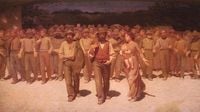The First of May, celebrated as Labor Day, is a significant date that honors the rights and achievements of workers around the globe. In Italy, this day has a rich history, intertwining with the country's political and social struggles, particularly notable since it became an official national holiday in 1949, following a period of repression during Fascism.
The origins of Labor Day can be traced back to the events of May 1, 1886, in the United States, where workers organized a general strike demanding an eight-hour workday. This protest escalated over three days, culminating in the tragic Haymarket Massacre on May 4, where eleven individuals, including both police officers and civilians, lost their lives in violent clashes. This incident became a symbol of the fight for workers' rights, inspiring the establishment of May 1 as International Labor Day. The Second International formally recognized this date in 1889 during its first congress in Paris, promoting solidarity among workers worldwide.
In the lead-up to the first May Day celebration in 1890, labor organizations in Italy worked tirelessly to raise awareness about the significance of this date. On April 20 of that year, a leaflet circulated in Naples urged workers to unite in solidarity, emphasizing the need for improved working conditions. Despite facing governmental opposition, the celebration was a surprising success, with large gatherings in cities across Italy. Friedrich Engels, the philosopher and social scientist, praised the unity demonstrated by the European and American proletariat during this pivotal moment.
However, the significance of May Day in Italy has not been without challenges. During the Fascist regime from 1924 to 1944, the celebration was suppressed, and the government moved the holiday to April 21, coinciding with the Natale di Roma (Nativity of Rome). This was part of a broader strategy to control labor organizations and replace them with state-sanctioned structures. Following the end of World War II, on May 1, 1945, partisans and workers celebrated their newfound freedom, marking a return to the original date.
In 1946, the Italian government officially reinstated May 1 as a national holiday, symbolizing the end of Fascism and a commitment to democratic freedoms. However, the first Labor Day after the war was marred by tragedy. In 1947, the Portella della Ginestra massacre occurred during a May Day celebration in Sicily, where a gang led by Salvatore Giuliano attacked a gathering of peasants, resulting in the deaths of eleven individuals and injuring many others. This event highlighted the ongoing struggles for workers' rights and the need for vigilance against oppression.
Today, the First of May is celebrated not only in Italy but across the globe, from Cuba to Turkey, Brazil to China. It is one of the most widely recognized holidays, with many countries observing it as a national holiday. In France, for instance, it is customary to gift a lily of the valley flower, symbolizing good luck. In Germany, a red carnation is worn to honor socialist movements, while in Finland, the holiday coincides with Vappu, a spring festival celebrated with picnics and festivities.
In Brazil, the "Dia mundial do trabalho" is celebrated predominantly in Santos, where locals take to the streets in a festive atmosphere. Meanwhile, in China, Labor Day is observed for an entire week, during which the government grants paid holidays to workers, a rare benefit in the country where standard contracts often do not include paid leave.
Since 1990, Rome has hosted a large concert known as the 'Concertone' to celebrate Labor Day. This event features prominent artists and serves as a gathering for people of all ages to enjoy music while reflecting on the values of workers past and present. It emphasizes the ongoing struggle for rights and the importance of standing up for those who may not have a voice.
As we recognize the First of May, it is essential to reflect on its historical significance and the ongoing fight for workers' rights worldwide. From its roots in the labor movement to its current celebrations, Labor Day remains a powerful reminder of the collective struggles for dignity, safety, and fair treatment in the workplace. The legacy of those who fought for these rights continues to inspire new generations to advocate for social justice and equality.





